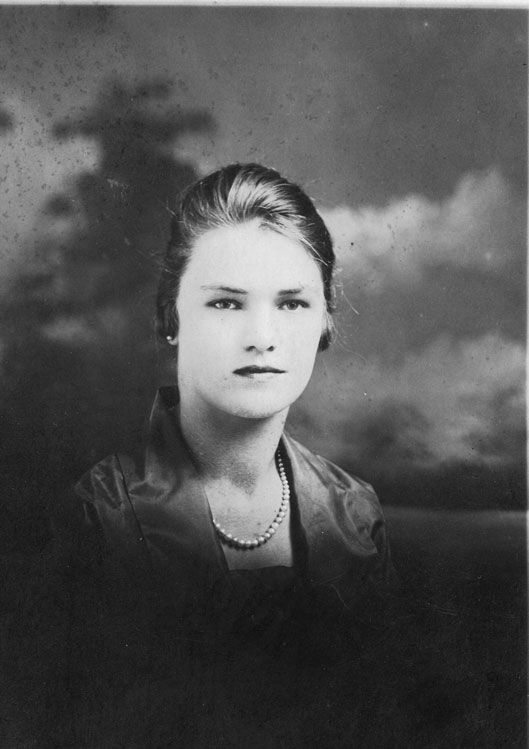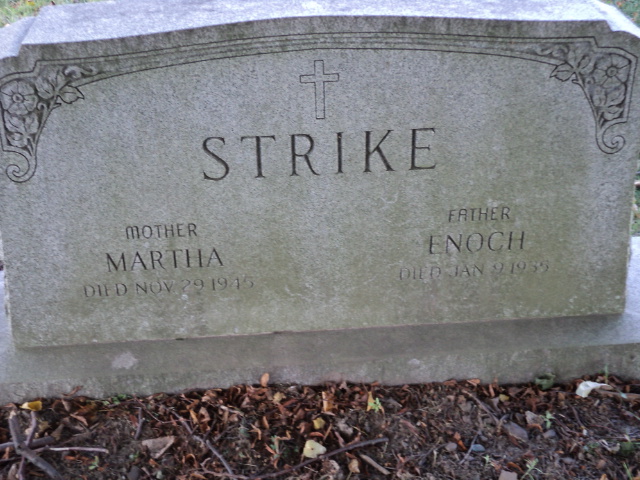Cecelia was born on August 15, 1902. There is some dispute over the actual birth day but there is significant assurance about the month and year. Her full legal name is Cecelia Rita Strike. Cecelia had indicated to some that her name really was Thephiria, (spelling undoubtedly incorrect), which is Phyllis in Lithuanian. Both her mother and father were born in Lithuania, (Anthem). Her father, Enoch, and her mother, Martha, were born in 1870. Her mother's maiden name was Balonis. Her father's surname in Lithuania was Straigis, which was later Americanized to Strike when he immigrated to the United States. Cecelia's parents were married in 1892. Martha gave birth to thirteen children. Four children died at birth or while they were still infants. Nine were raised to adulthood. The direct descendants are:
Elsie Unknown
Frank (Skinny) Unknown
John (Jack) Unknown
Andrew (Hogan) 11/30/1894 - 03/??/1968
Peter (Punk) 07/12/1898 - 04/02/1951
Anthony (Saunk) 06/19/1900 - 08/30/1975
Cecelia (Celie) 08/15/1902 - 06/14/1987
Anna (Annie) 07/24/1904 - 03/10/1993
Albert (Lucky) 07/17/1914 - 01/22/1987
Cecelia's grandfather was Thomas Straigis and her grandmother's name was Anna. Both Lithuanians. There is no information available on Anna's maiden name or their dates of birth and death. The parent's and grandparent's place of birth in Lithuania is unknown. The family lived in a four room house situated in Donahue's Row, which consisted of a rows of similarly sized homes with a narrow pedistrian walkway running between the row and adjacent back yards of 7th Street homes. Donahue's Row ran between 6th and 7th streets and Pear and Turnpike alleys in Mount Carmel. None of the homes had running water. Water was obtained from a pump, several hundred feet away,that was shared by all the families in the Row. The family owned a cow and a goat which were prized and was their source of milk. The goat was brought into the kitchen on cold winter nights to protect it. In those conditions it seems difficult to believe that the children looked forward to Christmas with as much excited anticipation as those of more recent generations. Their gifis consisted, typically, of an orange a nickel and a few nuts in a stocking. The family lived in Donahue's Row until the children reached their teens, went to work, and began to supplant the family income. With the extra income they moved to a nearby home on 7th Street, which the children, in their nostalgic later years, spoke of in comparative palatial terms. Their father, Ignatius, was a coal miner. Mining was physically exhausting in a short and long term life threatening environment. The workweek was 6 days long and an 8 hour work day was just a dream. Escape from these rigors was frequently found in the many barrooms that dotted the town. It was not uncommon for Ignatious to return home from work on payday less than sober and with less pay. The Hook family owned and operated one of those many bars, which was on 6th and Walnut Streets, just a few blocks from the Strike home. It was there where Cecelia met her future husband, Edward, on her forays to that bar to fetch beer for her father. The churches at that time were ethno-centric in order to accommodate the integration of immigrants into their communities. Poles, Czechs, Italians, Slovaks, etc., attended their "own" churches which conducted services in the native languages. In addition to spiritual needs, the churches all provided education for the children in grade schools erected by the churches. Sustaining the native language was a requirement in these schools. Cecelia did not finish grade school. By age 13 she began work in a cigar factory in town. She rolled the cigars and applied the outer leafs. She worked there until her marriage.
| 
